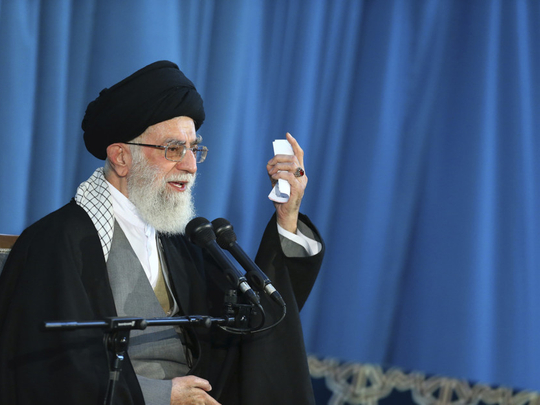
Dubai: Iranian Supreme Leader Ayatollah Ali Khamenei, an implacable opponent of America and its allies for most of his rule, will have to concede ground if he’s to end a nuclear dispute that has spanned three US presidencies.
Khamenei was selected as guardian of the mainly Shiite Islamic Republic on the death in 1989 of revolutionary leader Ruhollah Khomeini as the country reeled from a newly concluded eight-year war with US ally Iraq. Under his tutelage, Iran sparred with neighboring Sunni states for regional primacy, while sanctions deepened its isolation and crippled the economy. Through it all, Khamenei, 75, stressed self-sufficiency, pious loyalty and animosity toward the United States - the “Great Satan” - and Israel.
Now as negotiators attempt to nail down the give-and-take that would underpin a nuclear pact, Iran’s ultimate authority faces perhaps his biggest test. Iran wants to keep more of its enrichment potential, and have sanctions lifted faster, than its interlocutors at the seven-nation talks envisage.
“This is the single most important decision Khamenei will have to make in his 26-year tenure as supreme leader,” said Karim Sadjadpour, an Iran specialist at the Carnegie Endowment for International Peace in Washington. “It will be curious to see whether, and how, he spins a nuclear deal as an act of resistance rather than compromise.”
Before envoys regrouped this week in Lausanne, Switzerland, for a last push toward the end March deadline for a framework deal, Secretary of State John Kerry put the ball in the Iranians’ court. “Time is of the essence, the clock is ticking and important decisions need to be made” by Iran, he said.
In a video message to Iran’s people to mark the Persian new year, President Barack Obama said on Thursday that Iran and the US have their “best opportunity in decades to pursue a different future for our countries.”
While it was the election of President Hassan Rouhani with a mandate to end Iran’s economic stagnation that opened the door for a breakthrough in talks with world powers, the nation’s top cleric will have the final say.
The nuclear programme - which Iran says is intended for peaceful purposes and not the pursuit of atomic weapons as the US, Israel and others have charged - has become a totem of the nation’s proclaimed self-reliance.
Khamenei “has staked the well-being of his regime and his own personal authority on Iran preserving its self-declared right to enrich uranium,” said Alireza Nader, a senior policy analyst at the Rand Corporation.
Still, “while Khamenei is an ideologue, he has demonstrated the ability to make pragmatic decisions,” Nader said. He’s been under “a lot of pressure from within the political establishment, especially from centrists such as Rouhani who believed that Iran’s nuclear confrontation with the West would endanger the Islamic Republic’s survival,” Nader said.
As Iran’s ultimate arbiter, Khamenei has overseen governments run by both moderate reformist and conservative presidents.
For much of his rule, Iran’s relations with the US and its partners have been poor, with administrations from Ronald Reagan’s onwards imposing trade restrictions citing its alleged support for terrorism. During Bill Clinton’s terms in the Oval Office, Iran’s nuclear ambitions increasingly became a concern.
The United Nations has adopted half a dozen resolutions in an effort to stop Iran’s enrichment programme. US and European Union sanctions slashed oil exports and cut the economy off from the international financial system. Inflation and unemployment spiked during several years of recession.
Rumors of ill health have circulated for more than a decade, including claims that Khamenei, who has a white beard and wears a black turban, is suffering from prostate cancer.
Since taking office in 2013, Rouhani has sought to end Iran’s pariah status, engaging with the US and European powers and dropping the confrontational rhetoric of his predecessor, Mahmoud Ahmadinejad.
He has largely been backed by Khamenei, who called for “heroic flexibility” in the negotiations to achieve a deal in Iran’s national interests.
“He doesn’t want to be seen as the person whose decisions led to the collapse of negotiations,” Reza Haghighatnejad, an Istanbul-based independent political analyst, said by phone.
At the same time, Khamenei, who hasn’t traveled outside Iran since becoming supreme leader, has left himself an escape route and maintained ties with conservative hardliners who oppose the diplomacy.
He “routinely underlines that negotiations are limited to the nuclear field, meaning we are only solving a technical issue with the west not a political one,” according to Haghighatnejad.
While he’s been broadly supportive of the talks, Khamenei has called the US “untrustworthy,” and indicated it was Rouhani’s idea to embark on a diplomatic push. He also says the economy could overcome sanctions if Iranians knuckled down and relied on their own creativity and skills.
“No agreement is possible without the supreme leader’s imprimatur,” said Ali Vaez, senior Iran analyst at the International Crisis Group, “But his level of association with the deal is probably going to be a function of its quality.”











